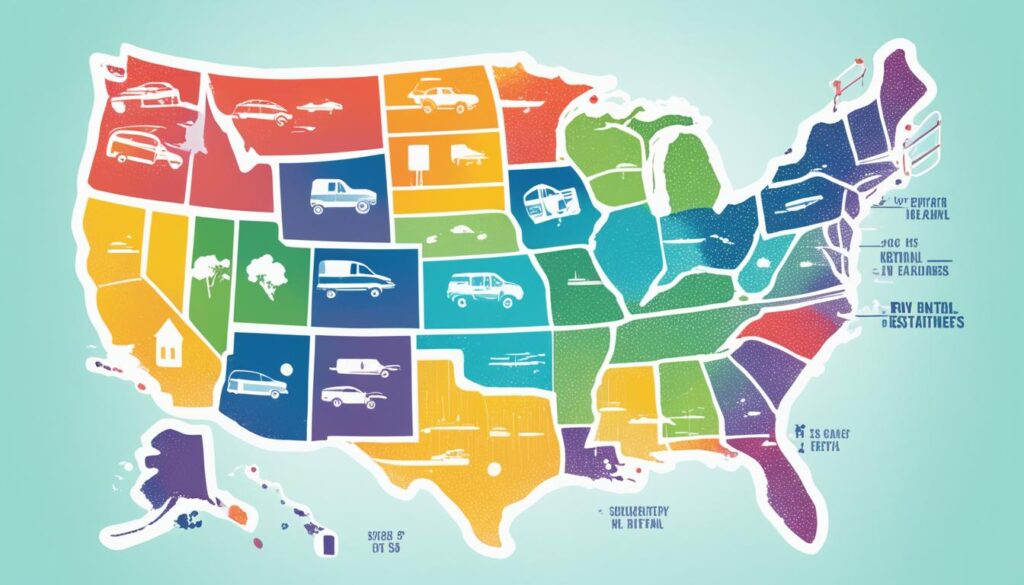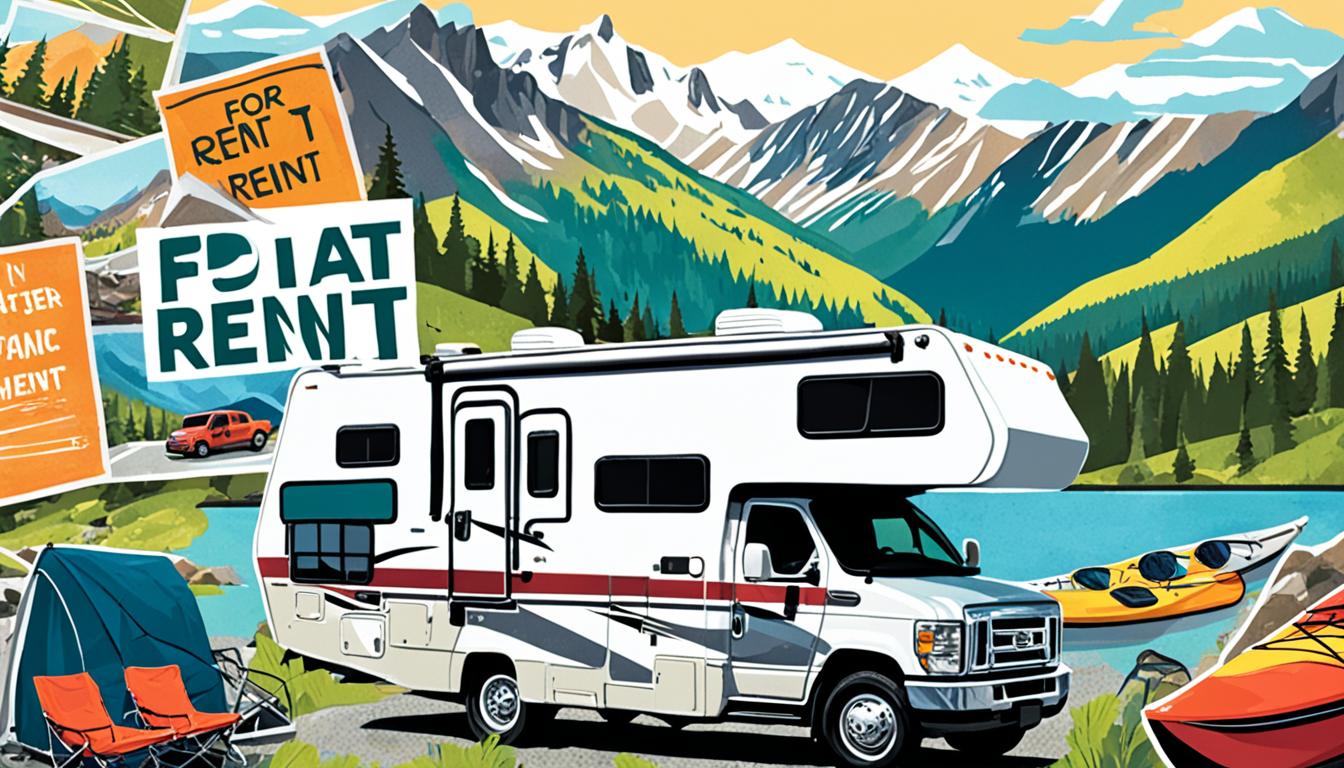Do you dream of traveling the world and making money from it? Starting an RV rental business could be your dream come true. The RV rental market is booming, expected to hit over $1 billion soon. As an RV rental entrepreneur, you could make $20,000 to $40,000 a year from each RV.
Think about turning your unused RV into a source of income. Most RV owners only use their vehicles 20 days a year. That’s a lot of unused potential! By starting your rental business, you can make the most of your investment and let others enjoy RV travel too.
Are you ready to start your RV rental business? This guide will help you get started and manage a successful RV rental business. We’ll cover everything from market trends to creating a business plan and setting up your operations.
Key Takeaways
- The RV rental market is projected to exceed $1 billion
- Potential earnings of $20,000 to $40,000 annually per RV
- Average RV usage is only 20 days per year
- Comprehensive planning is crucial for success
- Understanding market trends and target demographics is essential
- Legal considerations and operational strategies are key factors
Understanding the RV Rental Market
Starting an rv rental company means knowing the market well. The RV industry has grown a lot in recent years. This makes it a great choice for entrepreneurs.
Current market trends and growth projections
The global RV rental market is booming. In 2021, it was worth $800 million and is expected to grow by 7.4% each year. This growth comes from more people wanting to travel outdoors and the rise of “workations.” Many motorhome rental businesses are offering amenities for remote work.
Target audience demographics
RV rentals appeal to a wide range of people. While retirees have always been a big part of the market, millennials are now growing faster. The market is split almost evenly between those over and under 55. This change offers new chances for camper van rental services to customize their offerings.

Seasonal considerations
Seasonality is very important in the RV rental industry. Demand changes with the location and time of year. Summer is usually the busiest, while winter is slower in many places.
Some rv rental companies succeed by offering discounts in the off-season. They also target people who enjoy winter sports.
Knowing these market trends is crucial for a successful motorhome rental business. By matching your services with current trends and customer needs, you can grow in this exciting industry.
Creating a Solid Business Plan
Creating an rv rental business plan is key to starting your fleet. It should cover your vision, goals, and how you plan to succeed in the RV rental market.
Defining Your Value Proposition
Your value proposition makes you stand out. Think about offering special services like:
- Premium RV models with luxury amenities
- Flexible pickup and drop-off locations
- 24/7 roadside assistance
- Personalized trip planning services
These services can draw in more customers to your rv rental startup.
Financial Projections and Startup Costs
Getting your finances right is key for your rv rental business plan. Include costs such as:
- RV purchases or leases
- Insurance and maintenance fees
- Marketing and website development
- Staff salaries and training
Try to make a 60% profit on rentals to keep your business strong over time.
Marketing Strategy
Have a solid marketing plan to reach your audience. Think about using:
- Content marketing through blog posts and social media
- Search engine optimization (SEO) for online visibility
- Partnerships with travel websites and local tourism boards
- Paid advertising on relevant platforms
Starting an rv rental fleet needs careful planning and smart choices for success in this growing field.
Acquiring Your RV Fleet
Starting an RV rental fleet means picking the right RV types. Your choices will affect your business’s success and attract renters.
Choosing the Right Types of RVs
Focus on popular RVs like travel trailers and fifth wheels for your rental business. They’re easy to deliver and set up, perfect for RV travel trailer rentals. Think about these factors:
- Size and capacity
- Amenities and features
- Ease of use for renters
- Maintenance requirements
New vs. Used: Pros and Cons
Choosing between new and used RVs is key when starting an rv rental fleet. Each has its pros:
- New RVs: Latest features, full warranty, higher customer appeal
- Used RVs: Lower initial cost, avoid steep depreciation, potential for better profit margins
Buying 1-2 year old RVs and selling them after 2-3 years can help you make more money.
Financing Options
Look into different financing options for your RV fleet:
- Traditional bank loans
- RV-specific financing
- Business lines of credit
- Investor partnerships
RV loan monthly payments can be from $225 to $650, based on the RV’s value and loan terms. Pick the best option for your business and finances.

Don’t forget to consider ongoing costs like insurance, maintenance, and storage when planning your RV rental business. Making smart choices about your fleet will help you succeed in the growing RV rental market.
Legal Considerations and Business Structure
Choosing the right business structure is key for an rv rental entrepreneur. You can go for sole proprietorship, partnership, or a Limited Liability Company (LLC). Many choose LLC for its tax perks and protection from liability.
After picking a structure, register your business. You’ll need an Employer Identification Number (EIN) from the IRS. This is vital for taxes and opening a business bank account. It’s also smart to keep your personal and business money separate.
Following local laws is crucial for a successful rv rental business. Each state has its own rules, so do your homework or get advice from a lawyer. Insurance is also a must to protect your stuff and customers.
Taxes are a big deal for your rv rental startup. You might get deductions for things like maintenance, repairs, insurance, and depreciation. Working with a tax expert who gets the rv rental business can help you make the most of these benefits.
- Choose an appropriate business structure
- Register for taxes and obtain an EIN
- Open a separate business bank account
- Comply with local regulations
- Secure proper insurance coverage
- Maximize tax advantages
Getting these legal and structural things sorted early sets a strong base for your rv rental business. This way, you can focus on growing your business and giving great service to your customers.
Setting Up Your Operations
Starting your rv rental company needs careful planning. Let’s look at the main steps to set up your operations for success in the recreational vehicle rentals industry.
Developing rental policies and procedures
Make clear rules for your business. Set fair prices, outline how to book, and explain cancellation policies. This makes things clear for both you and your customers. Consider adding extras like camping gear or GPS units to increase your earnings.
Creating a maintenance schedule
Keep your RVs in great shape with regular check-ups. Plan for oil changes, tire rotations, and deep cleaning between rentals. This ensures your fleet is always ready and your customers are happy. Remember to leave some extra time for unexpected repairs.
Establishing customer service protocols
Excellent service can make your rv rental company stand out. Train your team to quickly answer questions, solve problems, and handle emergencies. Use booking software to manage reservations and payments. Partner with RV rental platforms for benefits like insurance and roadside assistance. Aim to make renting an RV easy for your customers.
FAQ
What are the current market trends in the RV rental industry?
FAQ
What are the current market trends in the RV rental industry?
The RV rental market is booming, expected to hit over
FAQ
What are the current market trends in the RV rental industry?
The RV rental market is booming, expected to hit over $1 billion soon. Over the last 20 years, RV ownership has jumped by 60%. Millennials are leading this growth.
Who is the target audience for an RV rental business?
Your customers could be anyone, from those over 55 to those under. Even remote workers on unauthorized breaks might be interested.
How does seasonality impact the RV rental business?
Seasonality affects RV rentals a lot. Demand changes with the seasons and location. Knowing these patterns is key to planning your business.
What are the key elements of a solid business plan for an RV rental startup?
A good business plan outlines your unique selling points, financial forecasts, and startup costs. It should also detail your marketing strategy. Use content marketing, SEO, social media, and PPC ads to reach your audience.
Should I purchase new or used RVs for my rental fleet?
Used RVs can save you money upfront and avoid initial depreciation. Look for deals 20% off market value from private sellers. Travel trailers or fifth wheels are good choices for easy delivery and setup. Weigh the pros and cons of new versus used RVs, including maintenance costs and warranty coverage.
What financing options are available for acquiring an RV rental fleet?
You can finance your RVs through traditional loans, with monthly payments between $225 and $650. It’s smart to look at different financing options and talk to financial advisors to find the best fit for your business.
What legal considerations should I keep in mind when starting an RV rental business?
Pick the right business structure, like a sole proprietorship, partnership, or LLC. Get an Employer Identification Number (EIN) for taxes and follow state and federal tax laws. Talk to legal and tax experts to make sure you’re following the rules and getting the most tax benefits.
What are some essential operational aspects to consider for an RV rental business?
Make sure you have clear rules for rentals, including prices, booking, and cancellations. Keep up with maintenance to keep your RVs in top shape. Have plans for customer service, including how to handle questions, complaints, and emergencies. Think about offering more services or equipment rentals to boost your income.
Who is the target audience for an RV rental business?
Your customers could be anyone, from those over 55 to those under. Even remote workers on unauthorized breaks might be interested.
How does seasonality impact the RV rental business?
Seasonality affects RV rentals a lot. Demand changes with the seasons and location. Knowing these patterns is key to planning your business.
What are the key elements of a solid business plan for an RV rental startup?
A good business plan outlines your unique selling points, financial forecasts, and startup costs. It should also detail your marketing strategy. Use content marketing, SEO, social media, and PPC ads to reach your audience.
Should I purchase new or used RVs for my rental fleet?
Used RVs can save you money upfront and avoid initial depreciation. Look for deals 20% off market value from private sellers. Travel trailers or fifth wheels are good choices for easy delivery and setup. Weigh the pros and cons of new versus used RVs, including maintenance costs and warranty coverage.
What financing options are available for acquiring an RV rental fleet?
You can finance your RVs through traditional loans, with monthly payments between 5 and 0. It’s smart to look at different financing options and talk to financial advisors to find the best fit for your business.
What legal considerations should I keep in mind when starting an RV rental business?
Pick the right business structure, like a sole proprietorship, partnership, or LLC. Get an Employer Identification Number (EIN) for taxes and follow state and federal tax laws. Talk to legal and tax experts to make sure you’re following the rules and getting the most tax benefits.
What are some essential operational aspects to consider for an RV rental business?
Make sure you have clear rules for rentals, including prices, booking, and cancellations. Keep up with maintenance to keep your RVs in top shape. Have plans for customer service, including how to handle questions, complaints, and emergencies. Think about offering more services or equipment rentals to boost your income.
Who is the target audience for an RV rental business?
How does seasonality impact the RV rental business?
What are the key elements of a solid business plan for an RV rental startup?
Should I purchase new or used RVs for my rental fleet?
What financing options are available for acquiring an RV rental fleet?
What legal considerations should I keep in mind when starting an RV rental business?
What are some essential operational aspects to consider for an RV rental business?
Author
-

Lucas Martinez is an accomplished entrepreneur with a passion for startups. He has launched and scaled multiple businesses, providing pragmatic advice on starting and growing a business.
View all posts



